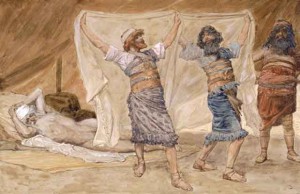[On the occasion of Father’s Day, this was first posted in 2012. Why on father’s day? Who is the father being focused on here? Well, for one, Noah whose drunkenness causes his son Ham to show disrespect for him. For another, Ham’s dishonoring of his parent had a consequence for his son Canaan who is the patriarchal father of the Canaanites, remember them? So, father figures in biblical narratives are held accountable for the good as well as bad consequences on future generations. Unfortunately! Translation: EF/Everett Fox, The Five Books of Moses—Admin1]
—————-
In the Genesis narrative about the flood that destroys all living creatures, only Noah’s family of eight and pairs of unclean and seven pairs of clean animals survived . . . a remnant of living creatures that will repopulate the earth. Noah admirably behaves and obeys every instruction of God until the flood has subsided and life has normalized but then, he slips a little as head of family. Nothing wrong with planting a vineyard and fermenting grapes into wine and imbibing the “fruit of the vine” which symbolizes joy and in fact is part of Sabbath celebrations . . . it’s Noah’s lack of moderation in drinking that leads to intoxication and losing control till he passes out, and throws modesty aside.
So what? Unfortunately, this one and only father of the two-generation’ start-up’ family provided the occasion for a son to dishonor his parent. An inebriated unconscious Noah arouses in his son Ham, something this son might have been harboring—or maybe not—he could have simply found amusement at the sight of his father, the text doesn’t say. The sight of his usually-in-charge parent opened for Ham an opportunity to have fun at his father’s expense. The reaction of his brothers Shem and Japeth indicates to us that in Noah’s family, they have been taught to show respect no matter what. The 5th of the 10 commandments has not been officially given as Law until generations later, but even so, the brothers’ behavior indicates all 3 were aware of “honor thy father.”
If Ham did not realize then the gravity and consequence of his paternal disrespect, he would realize it when a sober Noah pronounces a curse not on him but on his son Canaan.
Genesis/Bereshith 9:20-27
When he drank from the wine, he became drunk and exposed himself in the middle of his tent.
Ham, the father of Canaan, saw his father’s nakedness and told his two brothers outside.
Then Shem and Yefet took a cloak, they put it on the shoulder of the two of them,
and walked backward, to cover their father’s nakedness.
—Their faces were turned backward, their father’s nakedness they did not see.
When Noah awoke from his wine, it beame known (to him) what his littlest son had done to him.
He said:
Damned be Canaan,
servant of servants may he be to his brothers!
And he said;
Blessed be YHWH, God of Shem,
but may Canaan be servant to them!
May God extend/yaft
Yefet,
let him dwell in the tents of Shem,
but may Canaan be servant to them!
Now, this is really baffling to bible students. Is it fair for Canaan to reap the consequence of his father’s mistake?
Deuteronomy/Debari’ym 24:16:
Fathers are not to be put-to-death for sons,
sons are not to be put-to-death for fathers;
every-man for his own sin (alone) is to be put-to-death!
Doesn’t Ezekiel 18 painstakingly lay out the principle that each is responsible for his and only his own sin, that when the father eats sour grapes, the children’s teeth will not be on edge?
And yet other scriptures also seem to refer to inherited sin:
Exodus/Shemoth 34:5-9
YHWH came down in the cloud,he stationed himself beside him there
and called out the name of YHWH.
And YHWH passed before his face
and called out:
YHWH YHWH
God,
showing-mercy, showing-favor,
long-suffering in anger,
abundant in loyalty and faithfulness,
keeping loyalty to the thousandth (generation),
bearing iniquity, rebellion and sin,
yet not clearing, clearing (the guilty),
calling-to-account the iniquity of the fathers upon the sons and upon sons’ sons, to the third and fourth (generations)!
Quickly Moshe did homage, on the ground, bowing low,
and said:
Pray if I have found favor in your eyes,
O my Lord,
pray let my Lord go among us!
Indeed, it is a hard-necked people—
so forgive our iniquity and our sin
and make-us-your-inheritance!
Deuteronomy/Debariym 5:8-10 You are not to make yourself a carved-image of any form
that is in the heavens above that is on the earth beneath, that is in the waters beneath the earth.
You are not to prostrate yourselves to them, you are not to serve them,
for I, YHWH your God, am a jealous God,
calling-to-account the iniquity of the fathers upon the sons to the third and to the fourth (generation) of those that hate me,
but showing loyalty to thousands of those that love me, of those that keep my commandments.
How to resolve this seeming contradiction?
First, get to know the God of the Hebrew Scriptures! It’s like knowing someone so well that you know that person’s likes, dislikes, what he would do and not do, say or not say . . . so that when you hear about something out of character being attributed to that person, or something you just can’t believe he’s capable of doing, apply that to the God we know in the TNK. It works the same way.
If you know the self-revelation of the God Whose Name is YHWH not just through a few verses but the whole of TNK, then you would know He is a just God and will do what is right. Seeming contradictions like these verses are explainable in context.
Second, the immediate context in Exodus and Deuteronomy have to do with warnings against idolatry.
Third, notice the qualifiers and read these verses as a ‘hyperbole’ [exaggerated statements or claims not meant to be taken literally]; a comparison of God’s judgment [3rd and 4th generation who hate Him and turn away from Him] and his mercy and grace [thousands that love Him and keep His commandments].
The placement of the verse in Exodus occurs after the golden calf episode, when the Israelites so easily slip back to worshipping a god they can see so they have Aaron make one. After Moses pleads on behalf of the idolaters, LORD YHWH describes Himself to Moses—what a truly rare privilege this great leader had among all mankind!
The placement of the verse in Deuteronomy is the final speech of Moses not to the original multitude that had left Egypt 40 years earlier, [that generation had died] but this time to the 2nd generation born during the 40-year wandering in the wilderness . This generation is being prepared to enter the promised land. They were not present at the giving of the TORAH on Sinai, so they are reminded of everything their parents had heard and experienced.
Debari’ym 29:13
Not with you, you-alonedo I cut this covenant and this oath
but with the one that is here, standing with us today
before the presence of YHWH our God,
and (also) with the one that is not here with us today.
They have a fresh start, with the same guidelines regarding a lifestyle prescribed by their God whose self-description in Exodus is echoed by Moses here to remind them of generational transition of responsibility to be faithful to the Covenant and YHWH their God. What each generation choose to do has consequences for later generations but even when they face judgment, still divine grace and mercy flows from the heart of this loving God toward the repentant.
The Shema emphasizes the responsibility of fathers to teach their children the Torah. Not nature but nurturance seems to wield a strong influence on young impressionable children. When fathers/parents are amiss in their responsibilities toward their children, there are consequences. It’s a monkey-see-monkey-do kind of transference of values. Sociologists/psychologists now see patterns of behavior within families, where battered children tend to become batterers themselves; sexually abused children become sexual deviants; attitudes of parents spilling over to the next generation, until the pattern is broken by one who chooses to be different.
The context of these verses shows the “addressee” which is the nation of Israel. Israel is dealt with by God as a people, a nation, not individually; the nation as a whole suffers for the wrongdoing of a majority, specially when it comes to the sin of idolatry and rebellion.
It will turn out that Noah’s curse on Canaan is prophetic; ‘like father like son’. The land promised to the nation of Israel is populated by the Canaanites, descendants of Canaan. They are such an evil people that God commands the Israelites to cleanse the land of these inhabitants totally, but the Israelites failed to obey . . . and so until the exile, their generational sin of idolatry plagued the people.
Now back to the inconvenient truth for Ham — he forgot his father would sober up and and be incensed; and as biblical fathers usually pronounce blessings upon their children, Ham not only failed to get a blessing for himself but worse, hears a curse pronounced upon his son Canaan.



